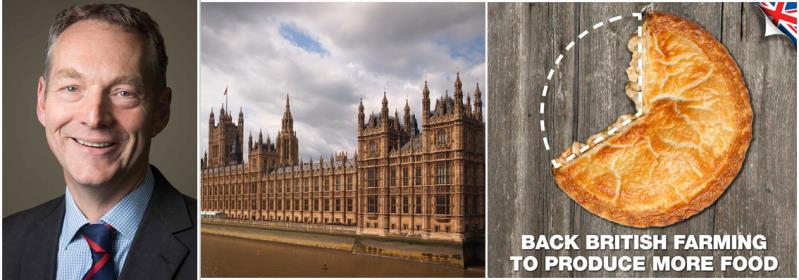He writes:
This year will see a new food and farming plan laid down by Defra. This demand was a central plank in the NFU’s election manifesto and I am pleased to say this call has been met with a receptive audience across the political spectrum with most parties committing to a plan in some form. However, few have spelled out the detail of such a plan. So, with the Conservatives offering an aspirational commitment to publish a 25-year plan to "grow more, sell more and buy more British food" what do farmers need from a food and farming plan – and what should the public expect it to deliver?
The NFU has issued many an early warning shot to the dangers of taking UK food supply for granted. The UK’s farming productivity has fallen away in recent decades, compared with our near neighbours in Europe, as well as those on the world stage. Declining productivity equates to declining competitiveness and for consumers, more worryingly, a slide in the nation’s self-sufficiency. For most farm businesses the threat is more fundamental still. Profit is seeping out of the sector and investment with it, not helped by the double whammy of increasing labour costs and intense pressure on retail prices.
- Why we're taking 50 tractors into 50 schools - East Midlands press adviser, Alison Pratt
- Big Farmland Bird Count - a farmer's perspective - Yorkshire farmer Richard Bramley
- Blog: Fruit and veg - why don't we eat more? - Lee Abbey, horticulture adviser
- Tesco's commitment must be followed up - Ruth Mason, Chief Food Chain Adviser
- Why Farming Matters penny drops for children - FACE chairman and Open Farm Sunday founder, Ian Pigott OBE
- Farming is a sector worth investing in - NFU chief science and regulatory affairs adviser Dr Helen Ferrier
A plan to ensure British agriculture thrives needs to be bold, it needs to address fundamental issues of productivity and competitiveness and it needs to see a culture change about how we value food and farming. It must set a confident path for all parts of the UK food system.
The UK has the EU’s fastest growing economy and its fastest growing population. Will consumers be eating more UK-grown, UK-produced food, or will the nation be forced to rely on imports? Last year’s harvest has shown what farmers can produce; world record arable crops. But high yields are not enough to sustain farm businesses, they need a reliable margin over costs, and the means to manage pests and diseases based on sound science.
Defra Secretary of State Liz Truss is a strong advocate of the UK’s world-leading agri-research, so I expect Defra’s plan will set out how this knowledge can benefit UK producers and consumers – and not be exported. It was beyond ironic at Oxford Farming Conference to hear a successful US potato grower thank the Biotechnology and Biological Sciences Research Counciland the British tax payer for developing and funding novel breeding research which can’t be used by UK producers. The 25-year plan must show how EU regulation and UK agencies will change to allow farms access to developments like novel breeding techniques, world-class plant protection products and other new technologies as they come onboard.
The plan also needs to set out how to achieve a fairer, more transparent supply chain. This should mean a bigger role for the Grocery Code Adjudicator but this will be too heavy-handed for most businesses. At the very least, the plan should recognise the industry’s voluntary codes, urge the whole supply chain to follow these terms and not treat them as fair weather agreements.
Finally government and ministers come and go. Farm businesses do not. 25-years will see five new governments take control at the helm. What goals will the strategy set for the next five years? The NFU will argue that the UK’s self-sufficiency, terms of trade in food and business profitability must be goals for the strategy to deliver – and for its measures of success.
